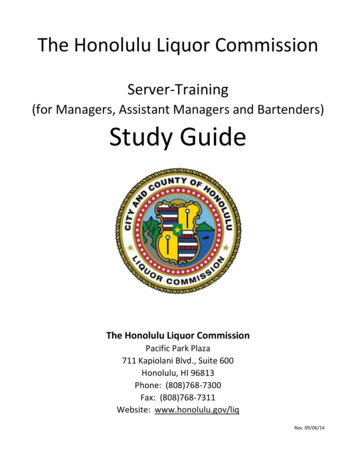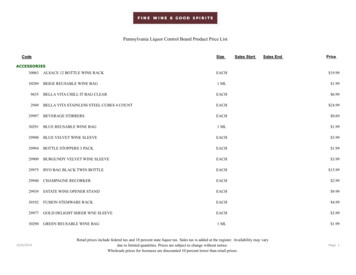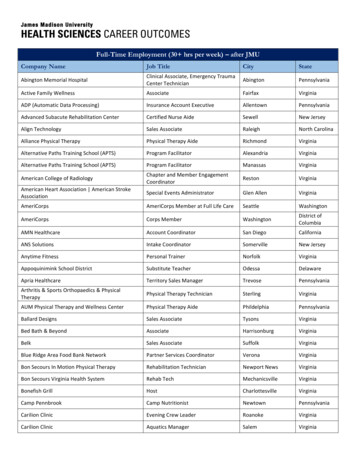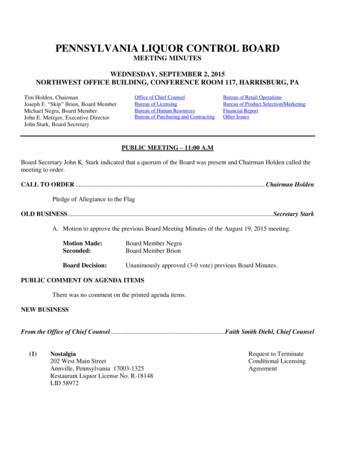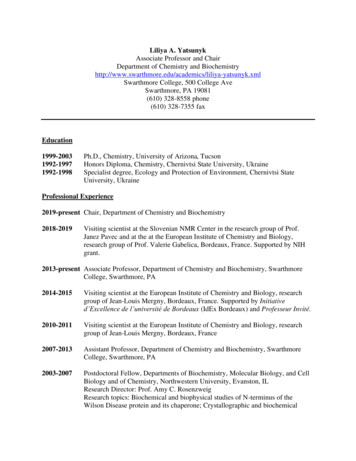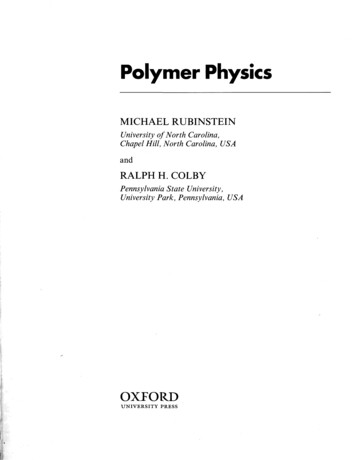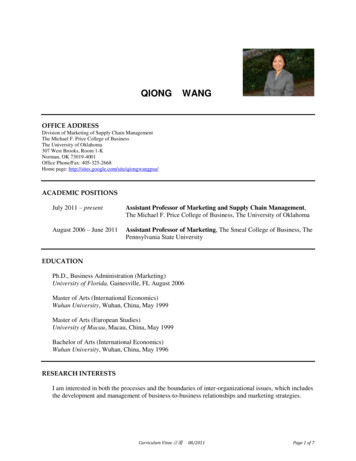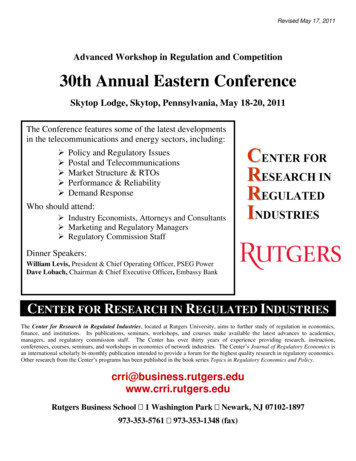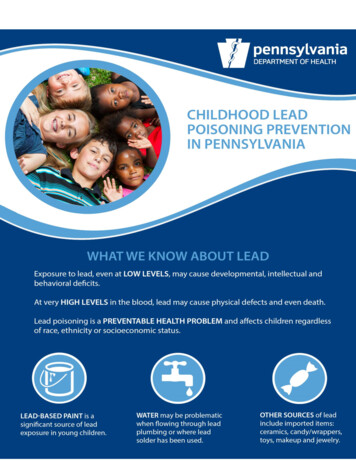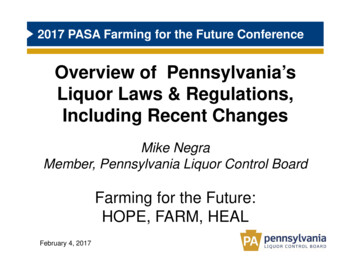
Transcription
2017 PASA Farming for the Future ConferenceOverview of Pennsylvania’sLiquor Laws & Regulations,Including Recent ChangesMike NegraMember, Pennsylvania Liquor Control BoardFarming for the Future:HOPE, FARM, HEALFebruary 4, 2017
Act 39 of 2016 – The Popular HighlightsWine Expanded Permit (WEP)Direct Wine Shipper LicenseExpired Restaurant License AuctionPA Industry Promotion BoardsAlcoholic Cider DefinitionBed & Breakfasts 2
Act 39 of 2016 – The Popular Highlights Eliminated restrictionson Sunday hours andthe number of Fine Wine& Good Spirits storesthat may be open onSundays. Authorized the PLCB to sell PA Lottery tickets. Expanded marketing opportunities includingpricing flexibility and a customer relationsmanagement program. Authorized new direct-delivery process forspecial liquor orders. 3
Act 166 – The Popular HighlightsPackage Reform forImportingDistributors andDistributorsDirect Malt orBrewed BeverageShipper LicenseAct 166Alcoholic Cider andMead Products 4Mead
PA-Licensed Alcohol Producers – Before Law ChangesLimited Wineries Produce up to 200,000 gallons of wine per year (a “winery”license is available from the PLCB without a production cap,but such a license can’t sell directly to the public or to retaillicensees). Sell its products to the PLCB, licensees and the public. Offer on- or off-premises sales by the glass or bottle, offertastings of its products, and sell food at its primary winerylocation and at up to five satellite locations. Sell its products at qualified farmers markets and alcoholiccider, wine and food exhibitions. Direct ship its own products to licensees and the public. Hold a hotel, restaurant or eating place license at its primarywinery location. 5
PA-Licensed Alcohol Producers – Before Law ChangesLimited Distilleries Produce up to 100,000 gallons of sprits per year (a “distillery”license is available from the PLCB without a production cap,but such a license does not have some of the sameprivileges). Sell its products to the PLCB, licensees and the public. Offer on- or off-premises sales by the glass or bottle, offertastings of its products, and sell food at its primary distillerylocation and at up to two satellite locations. Direct ship its own products to licensees and the public. Hold a hotel, restaurant or eating place license at its primarydistillery location. 6
PA-Licensed Alcohol Producers – Before Law ChangesBrewery Produce malt or brewed beverages (no production cap). Sell products to licensees and the public; may choose to selfdistribute its products or may grant distribution rights towholesale licensees for a particular area. May sell to individuals for off-premises consumption incontainers or packages of unlimited quantity and volume,and to licensees in quantities of not less than a case or inoriginal containers of at least 128 oz. Obtain a “brewery pub” license for its location for onpremises sales; may conduct on-premise sales without abrewery pub license under certain conditions (food/seating). Hold a hotel, restaurant or eating place license for use at thebrewery location. 7
2016 Law Changes of Interest to Limited Wineries 8Selling Other PAAlcohol Producers’ProductsLimited wineries may sell and cross-marketproducts of other PA-licensed breweries, licensedlimited wineries, licensed distilleries and licensedlimited distilleries. Sales of alcohol products fromother PA-licensed manufacturers are for onpremises consumption and cannot exceed 50percent of total alcohol sales.Restaurant Licenseat a SatelliteLocationA limited winery is allowed to hold and operate arestaurant liquor license at one of its PLCBapproved satellite locations, under certainconditions, in lieu of holding and operating arestaurant license at its main facility. Previously, itcould only hold a retail license at its main facility.MeadA limited winery may now produce and sell mead inaddition to the alcoholic cider that it produces, eventhough mead is now classified as beer.
2016 Law Changes of Interest to Limited WineriesNew BusinessOpportunities withWine ExpandedPermit HoldersLimited wineries may sell directly to wineexpanded permit holders (includinggrocery stores) for the resale of their wineproducts, greatly expanding the number ofpotential sales outlets for their products.Obtain a Direct WineShipper LicenseAs a result of changes to the law involvingdirect wine shipping, limited wineries mustnow obtain a direct wine shipper license inorder to ship directly to consumers. Thefee is 250 per year.Sell to Distributorsand ImportingDistributors 9Limited wineries may now sell theiralcoholic cider and mead to importingdistributors and distributors.
2016 Law Changes of Interest to Limited DistilleriesSelling Other PAAlcohol Producers’ProductsLimited distilleries may sell and cross-market theproducts of other PA-licensed breweries, licensedlimited wineries and licensed limited distilleries. Salesof alcohol products from other PA-licensedmanufacturers are for on-premises consumption andcannot exceed 50 percent of total alcohol sales.Satellite LocationsLimited distilleries, previously limited to twosatellite locations, may now have up to five PLCBapproved satellite locations.Permits for FarmersMarkets and Liquorand FoodExpositionsLimited distilleries may obtain permits to participatein, sell their products, and offer tastings at qualifiedfarmers markets and events qualifying as an“alcoholic cider, liquor and food exposition.” 10
2016 Law Changes of Interest to Breweries 11Selling Other PAAlcohol Producers’ProductsBreweries may sell and cross-market theproducts of other PA-licensed breweries,licensed limited wineries, licensed distilleriesand licensed limited distilleries. Sales ofalcohol products from other PA-licensedmanufacturers are for on-premisesconsumption and cannot exceed 50 percentof total alcohol sales.Permits forFarmers Marketsand Malt or BrewedBeverage and FoodExpositionsBreweries may obtain permits to participatein, sell their products, and offer tastings atqualified farmers markets and eventsmeeting the definition of a “malt or brewedbeverages and food exposition.”
2016 Law Changes of Interest to BreweriesAlcoholic Cider 12The definition of alcoholic cider was made moreconsistent with the federal definition, including ahigher ABV (8.5 percent) and higher carbonationlevels, so that there is parity between state andfederal definitions. This allows breweries tomake higher alcohol-by-volume ciders.MeadMead, or honey-based alcohol products, is nowdefined as a malt or brewed beverage, allowingbreweries to produce these types of productsand sell them as they would other malt orbrewed beverages. Limited wineries are alsopermitted to produce mead.Mug ClubsBreweries and retail licensees may offer mugclubs to patrons where members receive beer ata discount. Membership is made by writtenapplication and the licensee must maintain a listof all active club member participants.
2016 Law Changes of Interest – Promotion BoardsAct 39 also created two industry promotion boards to eachreceive 1 million annually from the PLCB to enhance thebusiness opportunities of Pennsylvania alcohol producers: Malt and Brewed Beverages Industry Promotion Board Wine Marketing and Research Program BoardAppointees to the boards are made by the Governor orSecretary of Agriculture and the General Assembly.The boards are charged with awarding grants to entities forincreasing the production of Pennsylvania-made beer andwine through promotion, marketing and research-basedprograms and projects. 13
2016 Law Changes of Interest to Retail LicenseesExpanded Sunday Sales Hours forRetail LicensesLabeled Beer TapsExterior Entrance 14
Recap of Rights & Privileges: Limited Winery LicenseBEFORE 2016 CHANGES Produce up to 200,000 gallons ofalcoholic ciders and wines per year.Sell to the PLCB, individualconsumers, and licensees.Offer on- or off-premises sales bythe glass or bottle, and sell food.Offer tastings/samplings of ownproducts.Maintain up to five additional Boardapproved locations in addition to themain facility.Hold and operate a restaurant,eating place or hotel license at theprimary winery location.Apply for farmers market andalcoholic cider, wine & foodexposition permits.Direct ship products to individualsand licensees.page 15 #TODAY May also sell products from otherlicensed breweries, distilleries,limited distilleries and limitedwineries for on-premisesconsumption (up to 50 percent oftotal sales).May continue to produce and sellmead, even though mead is now amalt or brewed beverage.May hold and operate a restaurantliquor license at a PLCB-approvedsatellite location in lieu of holdingand operating a restaurant license atits main location.Direct ship wine to non-licensedconsumers only after obtaining adirect wine shipper license from thePLCB.
Recap of Rights & Privileges: Limited Distillery LicenseBEFORE 2016 CHANGES Produce no more than 100,000gallons of liquor per year.Sell to individual consumers, retaillicensees and the PLCB.Offer sales by the glass or bottle.Offer tastings/samplings of ownproducts.Operate and maintain up to twoadditional locations.Hold and operate a hotel,restaurant or eating place licenseat primary distillery location.page 16 #TODAY May also sell products from otherbreweries, distilleries, limiteddistilleries and limited wineries foron-premises consumption (up to50 percent of total sales).May now operate up to fiveadditional PLCB-approvedlocations.Obtain permits to participate infarmers markets and off-premisesalcoholic cider, liquor, and foodexpositions.
Recap of Rights & Privileges : Brewery LicenseBEFORE 2016 CHANGES Produce malt/brewed beverages (noproduction cap).Sell products to licensees and thepublic; may self-distribute ordesignate distributors.May sell to individuals for off-premisesconsumption in containers orpackages of unlimited quantity andvolume, and to licensees in quantitiesof not less than a case or in originalcontainers of at least 128 oz.Obtain a brewery pub license for itslocation for on-premise sales; mayconduct on-premise sales without abrewery pub license under certainconditions (food/seating).Hold a hotel, restaurant or eatingplace license for use at the brewerylocation; however cannot selfdistribute throughout the state if itdoes.page 17 #TODAY May also sell products from otherbreweries, distilleries, limiteddistilleries and limited wineries foron-premises consumption (up to 50percent of total sales).Maintain beer labels in view ofcustomers, rather than having toindividually label beer taps.Offer mug clubs to patrons wheremembers receive malt or brewedbeverages at a discount.Obtain permits to participate infarmers markets and off-premisesmalt and brewed beverages andfood expositions.
Rights & Privileges: Restaurant LicensesBEFORE 2016 CHANGES Sell beer, wine & liquor for onpremises consumption between 7a.m. and 2 a.m.Obtain a Sunday sales permit tobegin selling at 11 a.m. onSundays, or at 9 a.m. if a meal isalso served by that time.Sell up to 192 oz. of beer (two sixpacks) per transaction for offpremises consumption.TODAY page 18 #Begin Sunday sales (with aSunday sales permit) starting at 9a.m. – meal requirement removed.Maintain beer labels in view ofcustomers, rather than individuallylabeling beer taps as previouslyrequired.Offer mug clubs to patrons wheremembers receive malt or brewedbeverages at a discount.Obtain a wine expanded permit tosell up to three liters (four bottles)of wine per transaction for offpremises consumption. Wine-togo sales may occur until 11 p.m.
Rights & Privileges: Who Producers Can Sell/Donate ToBed &BreakfastsSpecialOccasion& lleriesLimitedWineryThe PublicCider & MeadDistributors 19ImportingDistributors
Rights & Privileges: Who Producers Can Sell/Donate ToLimitedDistilleriesDistilleriesPLCBPLCBLimited WineriesLimited WineriesBreweriesBreweriesRetail LicenseesRetail LicenseesSpecial OccasionPermit HoldersSpecial Occasion &Wine/Spirits AuctionPermit HoldersSpecial Occasion &Wine/Spirits AuctionPermit HoldersDistilleries & LimitedDistilleriesDistilleries & OtherLimited DistilleriesOther Distilleries &Limited DistilleriesThe PublicThe PublicThe PublicBreweriesDistributors & ImportingDistributorsLimited WineriesOther BreweriesRetail Licensees 20
Obtaining a License – ProducersSeparate from federallicensing requirementsLicensing feesField investigation & reviewSatellite locations, farmers marketpermits, expo permits,storage facilities (breweries only) 21page #
Obtaining a Restaurant Liquor LicenseCountyQuota 22LicenseTransferand Salepage #LicenseTransferLimitationsLicenseTransferProcess
Auction of Expired Restaurant Licenses – Act 39Acts 39 & 85 require the PLCB to auctionabout 1,200 licenses that have expired orotherwise lapsed since 2000.First Auction – Fall 201640 licenses across 21 counties; 37 awardedSecond Auction – Bids due March 350 licenses across 48 countiesMore information is available on the restaurant licenseauction page of our website. 23page #
PA Producer OpportunitiesPA Proud Wine & Spirits 24page #
Limited Distilleries and Product Quality Testing Improperly distilled spirits can be deadly. Self-policing negates the need or interest for governmentintervention in quality testing.page 25 #
Resources for LicenseesBureau of Licensing ra-lblicensing@pa.gov or 717-783-8250Office of Chief Counsel ra-lblegal@pa.gov or 717-783-9454Responsible Alcohol Management Program ra-lbramp@pa.gov or 866-275-8237 26page #
QuestionsThank You! 27
Obtain a Sunday sales permit to begin selling at 11 a.m. on Sundays, or at 9 a.m. if a meal is also served by that time. Sell up to 192 oz. of beer (two six packs) per transaction for off-premises consumption. Begin Sunday sales (with a Sunday sales permit) starting at 9 a.m. –

